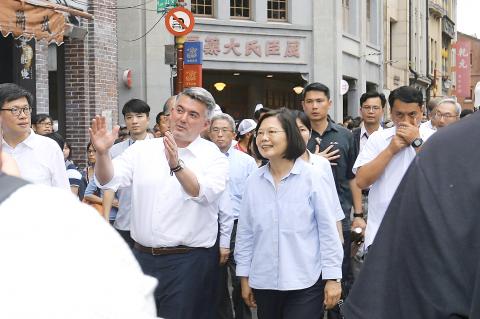US Senator Cory Gardner pledged to push for the passage of a bill that would require the US government to work with other nations to ensure that Taiwan is recognized internationally in the face of China’s efforts to block Taipei’s entry into international organizations and reduce its diplomatic allies.
“The importance of the Taiwan Allies International Protection and Enhancement Initiative [TAIPEI Act] is the bipartisan support we have for the act. Passage of the legislation can be challenging sometimes in the US, regardless of the subject matter. We would push for the passage of TAIPEI Act as well as the principle behind it, which signifies US support for Taiwan, US recognition that friends and allies around the globe support Taiwan as well as an important launch of strategy for global Taiwan relations,” Gardner, the Republican chairman of the Senate Foreign Relations Subcommittee on East Asia, the Pacific, and International Cybersecurity Policy, told a news conference at the Taipei Guest House.
He and three colleagues — Republican senators Marco Rubio and John Cornyn and Democrat Chris Coons — reintroduced the TAIPEI Act last month after it failed to win approval when it was first proposed last year.

Photo: CNA
Gardner said his visit, his fourth, was to stress the importance of the US-Taiwan relationship as well as Taiwan being a key part of a free and open US Indo-Pacific strategy.
The US Congress has passed several pieces of legislation to recognize US-Taiwan relations, he said.
One was the Asia Reassurance Initiative Act, which recognizes the importance of the Taiwan Relations Act (TRA) that has guided US policy on Taiwan over the past 40 years and would continue to be the guiding policy, he said.

Photo: Liu Hsin-de, Taipei Times
“I will continue to lead efforts in the US Congress to ensure Taiwan’s voice is represented in international organizations, we will continue to pursue high-level visits from dignitaries to Taiwan and to show Taiwan and its leadership around the globe,” he said.
Asked if he was concerned that US-Taiwan relations might change should a pro-China candidate win Taiwan’s presidential election in January next year, Gardner said that the US has concerns over behaviors that China has shown relating to fair trade practices, human rights and devaluation of voices of dissidents across China.
“All nations have to work together to ensure that China recognizes the dignity of fellow people as well as the ability for other nations to enter into trade relationships freely and fairly and to ensure that relationships with China are not affected by interference in the sovereignty of any nation,” the senator said.
President Tsai Ing-wen (蔡英文) said Gardner’s support for Taiwan embodies the spirit of the TRA and the US’ pledge to the values of democracy as she met with him at the Presidential Office earlier.
She later took the senator on a walking tour of the Dadaocheng (大稻埕) area.
The TAIPEI Act, if passed, would ask the US secretary of state to submit to the appropriate congressional committees a report on specific steps taken by the US to reaffirm and strengthen Taiwan’s international alliances worldwide within 90 days of its enactment.
It would authorize the US Department of State to downgrade ties with any government taking actions unfavorable to Taiwan.
Additional reporting by Yang Chun-hui

NATIONAL SECURITY THREAT: An official said that Guan Guan’s comments had gone beyond the threshold of free speech, as she advocated for the destruction of the ROC China-born media influencer Guan Guan’s (關關) residency permit has been revoked for repeatedly posting pro-China content that threatens national security, the National Immigration Agency said yesterday. Guan Guan has said many controversial things in her videos posted to Douyin (抖音), including “the red flag will soon be painted all over Taiwan” and “Taiwan is an inseparable part of China,” while expressing hope for expedited “reunification.” The agency received multiple reports alleging that Guan Guan had advocated for armed reunification last year. After investigating, the agency last month issued a notice requiring her to appear and account for her actions. Guan Guan appeared as required,

Japan and the Philippines yesterday signed a defense pact that would allow the tax-free provision of ammunition, fuel, food and other necessities when their forces stage joint training to boost deterrence against China’s growing aggression in the region and to bolster their preparation for natural disasters. Japan has faced increasing political, trade and security tensions with China, which was angered by Japanese Prime Minister Sanae Takaichi’s remark that a Chinese attack on Taiwan would be a survival-threatening situation for Japan, triggering a military response. Japan and the Philippines have also had separate territorial conflicts with Beijing in the East and South China

A strong cold air mass is expected to arrive tonight, bringing a change in weather and a drop in temperature, the Central Weather Administration (CWA) said. The coldest time would be early on Thursday morning, with temperatures in some areas dipping as low as 8°C, it said. Daytime highs yesterday were 22°C to 24°C in northern and eastern Taiwan, and about 25°C to 28°C in the central and southern regions, it said. However, nighttime lows would dip to about 15°C to 16°C in central and northern Taiwan as well as the northeast, and 17°C to 19°C elsewhere, it said. Tropical Storm Nokaen, currently

PAPERS, PLEASE: The gang exploited the high value of the passports, selling them at inflated prices to Chinese buyers, who would treat them as ‘invisibility cloaks’ The Yilan District Court has handed four members of a syndicate prison terms ranging from one year and two months to two years and two months for their involvement in a scheme to purchase Taiwanese passports and resell them abroad at a massive markup. A Chinese human smuggling syndicate purchased Taiwanese passports through local criminal networks, exploiting the passports’ visa-free travel privileges to turn a profit of more than 20 times the original price, the court said. Such criminal organizations enable people to impersonate Taiwanese when entering and exiting Taiwan and other countries, undermining social order and the credibility of the nation’s